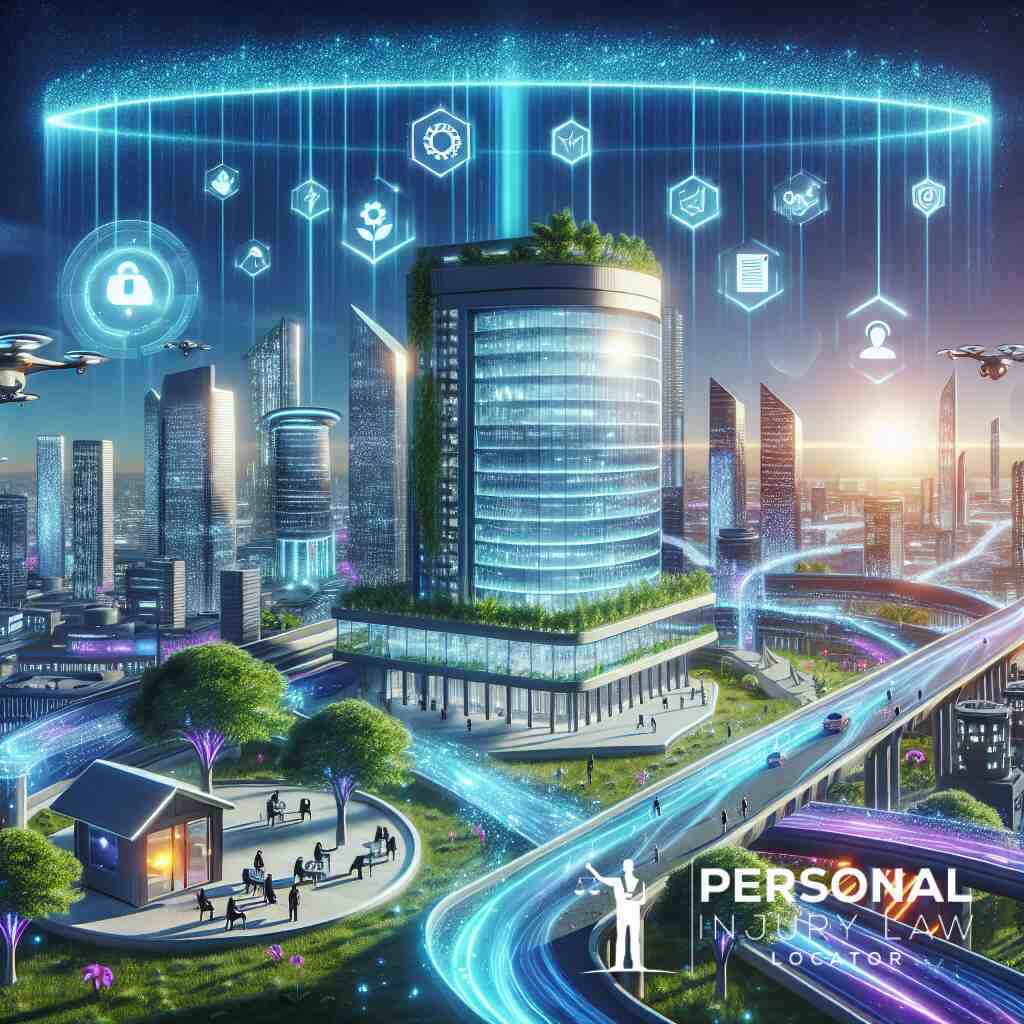 Posted On: 04/05/2025
Posted On: 04/05/2025Unveiling the Future Landscape of Personal Injury Claims
Predictive Analytics in Personal Injury Law
In the rapidly advancing world of personal injury law, predictive analytics is emerging as a game-changer. By leveraging vast arrays of data, legal professionals can anticipate case outcomes with greater accuracy. This evolution in predictive analytics in the legal field allows attorneys to provide more informed advice to clients, ensuring they understand potential legal trajectories and settlement possibilities. Furthermore, as these predictive models gain sophistication, they increasingly aid law firms in resource allocation, ensuring that clients receive optimal support throughout their legal journey. Embracing these advancements offers the potential to revolutionize efficiency, providing a competitive edge in the dynamic legal landscape.
Emerging Regulations Shaping the Industry
As we approach 2025, the legal industry is poised for transformation through evolving regulations. Legislative bodies are continually adapting to new technologies and societal developments to protect injured parties and uphold fairness in legal proceedings. The intricate framework of personal injury regulations now includes provisions for technological evidence and privacy concerns, which demand a nuanced understanding by legal practitioners. These shifts not only protect the interests of the injured person but also ensure a fair and just legal process. Staying updated on these changes is vital for anyone involved, from personal injury lawyers in Georgia to international tech-based firms.
The Evolution of Personal Injury Law and Technology
Technological advancements are reshaping the landscape of personal injury law. Innovations such as digital case management systems and AI-driven research tools are enhancing efficiency and accuracy in legal procedures. This evolution of personal injury law is not only transforming how cases are handled but is also influencing the very nature of legal representation itself. For instance, AI tools assist attorneys in case analysis, thereby optimizing strategies and improving client outcomes. Legal professionals who embrace these technological shifts position themselves to serve their clients better and adapt to the ever-evolving demands of the legal field. The integration of technology signifies a monumental shift towards a more streamlined and client-focused legal process.
Technological Advancements Revolutionizing Personal Injury Claims
The Impact of AI on Personal Injury Case Management
Artificial intelligence is significantly transforming personal injury case management, ushering in a new era of efficiency and precision. By implementing AI in personal injury case management, legal professionals can streamline administrative tasks while enhancing decision-making processes. AI algorithms help in sifting through vast amounts of data, providing valuable insights that aid in case strategy and client consultations. Attorneys utilizing these advanced tools can better predict case outcomes and optimize resource allocation, leading to more effective legal representation and potentially higher settlements for clients. As AI continues to evolve, its role in personal injury law is set to become more prominent, propelling the industry towards greater innovation and client satisfaction. Innovative Tactics for Navigating Personal Injury Claims
Digital Evidence Management and Blockchain Innovations
The integration of digital evidence management with blockchain technology is revolutionizing how personal injury claims are handled. Blockchain in legal processes provides a tamper-proof ledger for storing and verifying evidence, ensuring its authenticity and integrity throughout legal proceedings. This advancement is crucial in personal injury cases, where the reliability of evidence can make a significant difference in the outcome. By securing digital records with blockchain, legal teams can enhance transparency, reduce disputes over evidence tampering, and streamline the legal process. These innovations not only bolster trust in the legal system but also pave the way for more efficient and secure handling of personal injury claims.
Virtual Reality in Injury Assessment: A New Frontier
Virtual reality (VR) technology is breaking new ground in the assessment of personal injury claims. By using VR for injury assessment, legal professionals can recreate accident scenes and accurately illustrate the impact of injuries on juries and judges. This immersive technology provides a powerful tool for demonstrating the circumstances of an incident, offering a deeper understanding of the injured party’s experience. Moreover, VR can aid in the evaluation of long-term effects and rehabilitation progress, supporting more comprehensive and fair compensation claims. As VR continues to gain traction, its applications in personal injury law promise to enhance clarity and empathy in the courtroom, shaping a new frontier for future legal practices.
Navigating the Changing Dynamics of Insurance and Legal Strategies

Automated Insurance Claims and the Role of Technology
The burgeoning role of technology in the insurance sector is reshaping how personal injury claims are processed. Automated insurance claims are transforming the way insurance companies handle claims, making the process quicker and more efficient. With time-saving advances, injured individuals can experience shorter waiting times for claim approvals, ensuring faster access to the compensation needed for medical bills and property damage. This innovative approach empowers policyholders with greater transparency, as they can easily track the status of their claims through digital platforms. By leveraging technology, insurance companies can reduce the administrative burden on their staff, allowing them to focus on more complex cases. This evolution signifies a pivotal shift in the industry, heralding a future where speed and accuracy become the hallmarks of personal injury claims processing. Understanding Liability in Personal Injury Law Locator
Telemedicine’s Influence on Personal Injury Documentation
The integration of telemedicine in personal injury cases marks a significant trend toward modernized legal practices. With telemedicine in personal injury documentation, injured parties can receive timely medical consultations without the need for physical visits, thus prioritizing safety and convenience. This shift not only accelerates the documentation process but also ensures that medical records are promptly and accurately updated, facilitating smoother legal proceedings. Furthermore, telemedicine offers an inclusive approach, helping individuals in remote areas access top-tier medical professionals for assessments related to personal injuries. Such advancements highlight a crucial evolution in the legal landscape, providing injured individuals with robust, timely support that aligns seamlessly with their legal claims. As telemedicine becomes more embedded in legal processes, its influence on documentation is set to grow, driving efficiency and accuracy in personal injury cases.
Alternative Dispute Resolution: Trends and Predictions for 2025
Changing legal landscapes are increasingly embracing alternative dispute resolution (ADR) as a viable approach to handling personal injury claims. ADR methods, including mediation and arbitration, offer a less adversarial and more cost-effective avenue for resolving disputes between injured parties and insurance companies. Looking ahead, trends in alternative dispute resolution indicate that more personal injury cases will gravitate toward these solutions, aiming to expedite settlements while reducing courtroom congestion. The growing preference for ADR is driven by its potential to foster amicable resolutions, minimizing emotional distress and financial strains for all parties involved. As the legal community continues to recognize the value of ADR, personal injury victims can expect more streamlined and cooperative resolution processes, ultimately leading to fairer and faster outcomes for their cases.
Pioneering Hybrid Legal Services for the Modern Age
The Emergence of Remote Injury Consultations
In today’s rapidly evolving landscape, the concept of remote injury consultations is increasingly becoming the norm. By leveraging telecommunication technologies, personal injury law is more accessible than ever, breaking geographical barriers for clients and legal experts alike. Through platforms like Personal Injury Law Locator, individuals can connect with a personal injury lawyer in Tennessee or a specialist in any other state with just a few clicks. This approach not only streamlines the initial consultation process but also enhances client convenience, allowing for quicker case assessments and faster response times from legal professionals. As more clients and attorneys adopt these technologies, we can expect a significant transformation in how legal advice is sought and delivered, emphasizing efficiency and accessibility.
Combining Traditional and Digital Legal Services for Optimal Outcomes
The melding of traditional legal services with digital innovations marks a significant shift in achieving optimal outcomes for personal injury claims. By integrating advanced technological tools with age-old legal practices, law firms position themselves to offer more comprehensive support to their clients. Platforms like Personal Injury Law Locator showcase the hybrid legal services of the modern age, blending face-to-face consultations with virtual meetings, ensuring that clients receive personalized yet efficient service. As law firms continue to harness these innovations, the potential for improved client engagement and satisfaction grows exponentially, fostering a legal environment that is both futuristic and client-centered. This evolution promises to redefine the standards for excellence in legal representation, paving the way for a more adaptable and responsive legal industry.
Data-Driven Legal Strategies for Predictive Success
The advent of data-driven legal strategies is carving a new pathway toward predictive success in personal injury law. By harnessing sophisticated analytics and technology, attorneys are equipped to anticipate case trends and tailor their approaches accordingly. This transition is heralded by platforms integrating AI in personal injury case management, allowing legal teams to analyze vast data sets and predict outcomes with unprecedented accuracy. Such strategies not only enhance decision-making processes but also bolster the confidence of clients as they navigate their legal journeys. As these data-driven methodologies become more prevalent, they promise to revolutionize the efficiency and effectiveness of legal strategies, offering a glimpse into the future of a more informed and strategic legal process dedicated to delivering superior results.
Envisioning a New Era of Personal Injury Settlements
Future Compensation Forecasts and Legal Developments
As the landscape of personal injury claims evolves, future compensation forecasts and legal developments are shaping a revolutionary paradigm. By 2025, we anticipate substantial changes in how settlements are determined and awarded. Growing emphasis on technology in the legal field ensures a more data-driven approach to predicting compensation, aligning with the broader trends of predictive analytics in personal injury law. As a result, injured parties can anticipate more accurate predictions of potential settlements, allowing them to make informed decisions about their claims. Additionally, legal practitioners are becoming more adept in navigating the complexities of injury compensation developments, leading to fairer and swifter outcomes in personal injury lawsuits, which ultimately benefit both plaintiffs and defendants.
Legaltech Innovations Enhancing Client Representation
Legaltech innovations are proving to be powerful tools for enhancing client representation, driving a monumental shift in how personal injury cases are handled. How Can Personal Injury Law Locator Aid Emotional Cases? Cutting-edge technologies, such as AI-driven analytics and automated document management systems, are empowering lawyers to streamline their practices, making legal services more efficient and cost-effective. For instance, platforms like Personal Injury Law Locator seamlessly integrate these technologies by connecting clients with the best-suited attorneys instantly. Such advancements promote transparency and accuracy, allowing for a nuanced understanding of each case’s unique aspects. These legal innovations enhancing representation not only fortify the lawyer-client relationship but also enhance the overall client experience, ensuring a more proactive approach to achieving successful outcomes in personal injury litigation.
The Role of Smart Contracts in Future Civil Lawsuits
Smart contracts are poised to revolutionize the future of civil lawsuits by introducing new levels of efficiency and reliability in legal transactions. These self-executing contracts, encoded with the terms and conditions of an agreement, reduce the need for intermediaries, thus saving time and minimizing costs involved in legal proceedings. In the arena of personal injury claims, smart contracts can automatically dispense settlements once conditions are met, ensuring all parties adhere to agreed terms without delay. This innovation promises to make legal processes more transparent and less prone to disputes, as each step is embedded in blockchain technology, offering increased security and accessibility. As we approach 2025, the integration of smart contracts in future lawsuits will become more commonplace, setting a new standard in the efficiency of settling personal injury disputes.
Frequently Asked Questions
Question: How is AI transforming personal injury claim management in 2025?
Answer: Artificial intelligence is revolutionizing personal injury claims management by enhancing efficiency and precision. How Personal Injury Law Locator Transforms Claim Processes AI systems analyze massive data sets to offer predictive insights, allowing personal injury attorneys to forecast case outcomes with greater accuracy. This leads to optimized strategies and ensures that resources are allocated effectively, ultimately boosting the chances of higher settlements for injured individuals. Personal Injury Law Locator connects you with attorneys who leverage these cutting-edge AI tools, ensuring that you receive expert guidance and representation.
Question: What role does technology play in the future of personal injury claims, according to the blog ‘What is the Future of Personal Injury Claims in 2025’?
Answer: Technology plays a pivotal role in the future of personal injury claims, as highlighted in ‘What is the Future of Personal Injury Claims in 2025?? Innovations such as predictive analytics, advanced case management systems, and legal tech tools are streamlining legal processes, making them more efficient and accurate. These advancements ensure that injured parties receive timely and effective representation. Personal Injury Law Locator is at the forefront of integrating these technologies, offering clients seamless access to expert personal injury lawyers across the US.
Question: How are blockchain and digital evidence management expected to influence personal injury claims by 2025?
Answer: By 2025, blockchain and digital evidence management are set to transform personal injury claims by ensuring the authenticity and integrity of evidence. Blockchain technology provides a tamper-proof ledger which isr crucialfor maintaining trustworthy digital records. This enhancement bolsters transparency minimizes disputes over evidence and streamlines the legal process. At Personal Injury Law Locator, we connect you with attorneys who utilize these advanced technologies to offer you unmatched security and reliability in handling your personal injury case.
Question: How do hybrid legal services enhance client outcomes in personal injury cases?
Answer: Hybrid legal services, combining traditional consultations with digital innovations, significantly enhance client outcomes in personal injury cases. Advanced Tips for Leveraging an Injury Law Locator By offering remote injury consultations and leveraging telecommunication technology, Personal Injury Law Locator ensures unparalleled accessibility and convenience. This approach enables timely case assessments and promotes swift communication between clients and attorneys, resulting in more effective legal strategies and improved settlements for the injured parties. What Defines Injury Lawyer Quality Near You?
Question: What trends in alternative dispute resolution are anticipated for 2025 in personal injury claims?
Answer: By 2025, alternative dispute resolution methods such as mediation and arbitration are expected to become more prevalent in personal injury claims. These methods offer less adversarial and more cost-effective solutions for resolving disputes, expediting settlements, and easing courtroom congestion. Comparing Emotional Distress Claims Across the US Comparing Settlement Strategies Across US States At Personal Injury Law Locator, we facilitate connections with legal experts skilled in ADR, ensuring that you receive amicable resolutions that minimize emotional and financial stresses during your legal journey.



